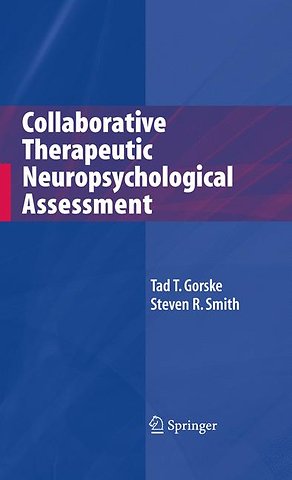Collaborative Therapeutic Neuropsychological Assessment
Paperback Engels 2010 1e druk 9781441925916Samenvatting
One of the challenges the field of clinical neuropsychology faces is to develop an assessment process that is relevant and responsive to the needs of patients. Indeed, it has been suggested that the survival of neuropsychology as a clinical discipline may be threatened due to an overemphasis on diagnosing cognitive deficits as opposed to developing methods that meet patients’ needs. One way to meet this need is for psychologists to extend their services by developing clinical interventions that contribute to enhancing patients’ cognitive and emotional well-being. Providing feedback from the results of neuropsychological tests is one method suggested as a way to enhance patient care and satisfaction with the assessment process while providing a link between clinical assessment and therapeutic interventions.
In current practice, providing feedback to patients about the results of neuropsychological assessments has been considered an optional procedure by clinicians and thus received little attention in the literature. Yet there is evidence that when feedback is provided to patients the effects are overwhelmingly positive. Feedback provides a bridge between assessment and treatment by facilitating the development of applicable treatment plans. There is no agreed upon conceptual framework for providing feedback from neuropsychological assessment, although researchers have made recommendations. However, these recommendations have done little to affect clinical practice and training despite the fact that including patient-oriented feedback enhances the likelihood that neuropsychological assessment will remain a relevant and important component of patient care.
The purpose of this proposed book is to first describe developments in methods of neuropsychological assessment feedback that involve active collaboration with patients in an open exchange of information and results. Second, we will present a comprehensive model for conducting neuropsychological assessment feedback. The authors of this book are expert clinical practitioners and academic researchers who are at the forefront of the development and implementation of Collaborative Therapeutic Neuropsychological Assessment methods.
Specificaties
Lezersrecensies
Inhoudsopgave
I. Introduction: Overview and Background of CTNA a. This chapter will begin with brief case examples of feedback sessions conducted in a traditional manner and according to CTNA methods as a segue to an overview of CTNA as contrasted with standard practice in neuropsychological assessment, commonly referred to as the 'information gathering model.' b. The next section describes current challenges facing the field of Clinical Neuropsychology. Psychological and neuropsychological assessment have struggled in the era of managed care for a number of reasons, not the least of which include the advent of radiology methods for identifying brain lesions, consumer and provider misunderstanding of the rationale and usefulness of neuropsychological assessment, and the identity confusion many neuropsychologists face in the roles of treatment and rehabilitation planning. CTNA will be introduced as a method for meeting these challenges and helping to make neuropsychological assessment responsive to consumers, providers, and referral sources while enhancing collaboration between professions. An overview will be provided of a published survey, conducted by the editors, on neuropsychological assessment feedback practices.
II. Conceptual Foundations: Brief history of neuropsychological assessment feedback a. Therapeutic Assessment Models: The historical background for using psychological testing as a collaborative and therapeutic intervention. First, a review of the early projective test studies will be described. Then the chapter will describe Constance Fischer’s Individualized Psychological Assessment and Stephen Finn’s Therapeutic Psychological Assessment. b. Luria’s work: The chapter will begin with an analysis of Alexandr Rumanovich Luria’s Neuropsychological Investigation and how his methodology provides aprecursor to contemporary client centered neuropsychological interventions and rehabilitation. c. Literature review: Second, a review of the empirical literature will be provided on recommendations for providing feedback from neuropsychological tests. d. Motivational Interviewing: The next generation of client centered feedback. The section will discuss the application of Motivational Interviewing methods for providing client centered feedback. This is relevant because CTNA feedback methods are based on the MI conceptual framework. e. Contemporary applications: In this section a review will be provided on the current work being conducted on CTNA methods. This will include a review of research conducted by the primary editors; the work of Dr. Diane Engelman from the Center for Collaborative Psychology and Psychiatry; Dr. John Strang’s work with the Neuropsychology School Conference; and the study by Dr. Phillip Pegg on providing medical and neuropsychological information to traumatic brain injury patients.
III. CTNA Model. Basic Assumptions of CTNA. The patient/caregiver/referral source have noticed a change in the patients cognitive and/or behavioral functioning and would like a professional to tell them if there is a true change and to what degree, severity, and if possible potential causes. The patient/family are distressed because of the change in the patient’s cognitive/behavioral functioning. Part of the reason they are coming in for the evaluation is to receive help, direction, and guidance in order to feel less distressed. Patients would like to know of potential ameliorative strategies so that the patient performs better in school, work, social spheres, and begins to feel better about him/herself.
Anderen die dit boek kochten, kochten ook
Rubrieken
- advisering
- algemeen management
- coaching en trainen
- communicatie en media
- economie
- financieel management
- inkoop en logistiek
- internet en social media
- it-management / ict
- juridisch
- leiderschap
- marketing
- mens en maatschappij
- non-profit
- ondernemen
- organisatiekunde
- personal finance
- personeelsmanagement
- persoonlijke effectiviteit
- projectmanagement
- psychologie
- reclame en verkoop
- strategisch management
- verandermanagement
- werk en loopbaan






